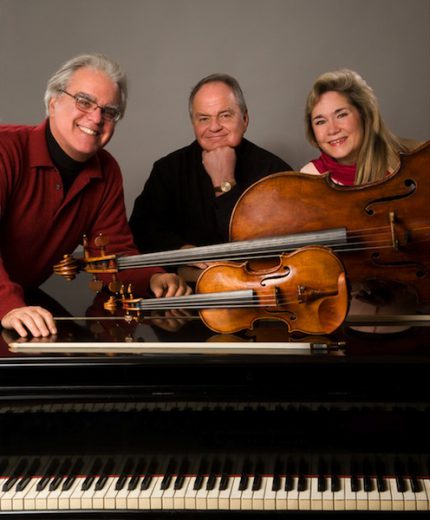KLR Trio opens new year with impassioned Brahms, Dvořák

The Kalichstein-Laredo-Robinson Trio performed Sunday at Gusman Hall for Friends of Chamber Music. Photo: Christian Steiner
The debt owed to Antonin Dvořák by the world’s cellists is well known. But beyond composing their instrument’s greatest concerto, he also gave the cello an unusually prominent role in his most celebrated piano trio.
In the Kalichstein-Laredo-Robinson Trio’s concert Sunday at the University of Miami’s Gusman Hall, cellist Sharon Robinson seized attention with her bold, impassioned playing of the desolate opening notes of Dvořák’s “Dumky” Trio and rarely let up.
Robinson has a classic, luscious, golden cello sound, and there were endless occasions to use it in this work—a purposely episodic composition that lurches moment to moment from sadness to joy to aggression to romance, with an overarching tone of nostalgia.
The ensemble, usually referred to as the KLR Trio, is a perennial performer on the Friends of Chamber Music of Miami series, which presented Sunday’s concert in Coral Gables.
Despite playing together for more than 40 years, having made their debut at the White House for President Carter’s inauguration, the three musicians maintain sharply individual styles. Violinist Jaime Laredo, Robinson’s husband, plays in a lighter manner than his wife. He excelled in the pointed, rapid-fire accompaniments that give this work much of its texture, as his bow bounced across the strings.
Unfortunately, these passages couldn’t always be heard. In the sudden blast of exuberance that bursts forth in the opening minutes of the piece, Robinson’s cello and the piano playing of Joseph Kalichstein almost completely covered Laredo’s violin, depriving the passage of its essential manic edge.
Laredo’s playing was technically uneven as well. His tone could turn warbly and shaky in climactic passages high on the uppermost string that are supposed to soar. Yet he played with a big, rounded, throaty tone in a melody on the instrument’s lowest string, and the Romantic sensibility of his style fit this highly emotional composition. Kalichstein provided a sturdy rhythmic grid for the string players, with graceful, easy performances of the right-hand passages that ornament the melodies.
By far the best playing of the afternoon came in the Brahms Piano Quartet in G Minor, Op. 25, one of the composer’s best-known chamber works and a piece that demonstrates the composer’s vast range. There are intricate passages that recall Bach, soaring melodies and hard-driving gypsy-inspired music. Joining the KLR musicians for this piece was an illustrious guest, Cynthia Phelps, principal viola of the New York Philharmonic.
The opening Allegro was fast and energetic. If the speed and momentum produced occasional moments of scrappy ensemble work, it paid off in the current of electricity that ran through the movement. Kalichstein brought sweep and grandeur to the difficult piano part—played at its premiere by Clara Schumann–without overwhelming the other players.
There were dramatic touches throughout, with Kalichstein leading a particularly effective slowing of the music to set up the introduction of a new theme. A murky passage toward the end, where long, slurred passages alternate quickly from string to string, was especially striking in the shrouded, mysterious tone created by the violin, viola and cello.
Violinist Laredo could play with a big tone when he wanted to, but mostly he held back. Yet in the Andante of the Brahms, it helped give the ensemble an unusually dark and rounded tone, dominated by viola and cello, which brought this movement to a roiling climax.
The finale, an early expression of Brahms’ fondness for gypsy music, opened in a manner that was just loud and matter-of-fact, lacking the brooding, nervous energy found in other performances. But the momentum quickly picked up, with lots of sizzle in the playing, and the players maintained this dynamism to the end.
The KLR Trio opened the concert with a curiosity, Beethoven’s Allegretto in B-flat, WoO. 39 (work without opus number 39). This was a simple, Classical-style work composed as a gift for a young piano student, but there were touches of the mature Beethoven throughout, and the musicians played in a committed, forceful manner.
Friends of Chamber Music will present the Ehnes Quartet with violist Roberto Diaz in an all-Beethoven program 8 p.m. February 1 at Gusman Concert Hall. miamichambermusic.org
Posted in Performances
Leave a Comment
Mon Jan 8, 2018
at 12:07 pm
No Comments